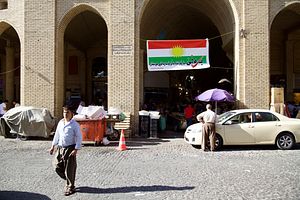On September 25, 2017, Chinese Foreign Ministry spokesman Lu Kang announced China’s official position on Iraqi Kurdistan’s quest for independence. At a daily news briefing, Lu insisted that China supported the preservation of Iraq’s territorial integrity; and advocated an inclusive diplomatic solution to the Kurdish question that addressed negative historical memories and facilitated the reconstruction of Iraq.
Despite Lu’s statement and China’s long-standing opposition to separatist movements, a closer examination of China’s Middle East strategy reveals that Beijing could benefit from the secession of Iraqi Kurdistan. China’s deep investments in Iraqi Kurdistan’s energy sector and the potential for an independent Iraqi Kurdistan to be a valuable Chinese counterterrorism partner ensures that Beijing is unlikely to aggressively oppose the secession of Iraqi Kurdistan from Iraq.
China’s Economic Interests in Iraqi Kurdistan
Even though China formalized a strategic partnership with Iraq in 2015 and was the leading investor in Iraq’s oil industry after the withdrawal of U.S. troops in 2011, Beijing has also maintained a close economic relationship with Iraqi Kurdistan. The oil industry of Iraqi Kurdistan is the principal area of investment for Chinese businesses, as Iraqi Kurdish oil manufacturers produce 650,000 barrels of oil per day, and intend to increase their production to 1 million barrels a day by 2020.
As the United States has invested considerably in Iraqi Kurdistan’s oil industry, China’s investments in Iraqi Kurdistan are aimed at demonstrating that it can compete directly with Washington as an economic power in a strategically important region of the Middle East. To demonstrate Beijing’s economic clout, Chinese state-owned oil companies have engaged in systematic purchases of rival Western oil companies which have investment stakes in Iraqi Kurdistan.
Chinese energy giant Sinopec’s $8.27 billion purchase of Addax, a Swiss-Canadian oil company with extensive investments in Iraqi Kurdistan, in 2009 was the most striking example of Beijing’s increased willingness to assert its economic influence in Iraqi Kurdistan. As Kurdish oil producers frequently offer more favorable deal terms to foreign investors than Iraqi government-owned oil companies, Sinopec used its financial stake in Iraqi Kurdistan’s oil industry to develop the Taq Taq oil field and create 16 new oil wells in Iraqi Kurdistan from 2009-2013.
As the Iraqi government has imposed legal restrictions on foreign investment in Iraqi Kurdistan’s oil industry, which have been supported intermittently by the United States, the secession of Iraqi Kurdistan would allow China to cut lucrative bilateral deals with Kurdish companies with fewer regulatory obstacles.
Even though the Iraqi government has actively courted the United States, European Union, Russia and India for energy sector investments, China’s willingness to sign long-term deals with Iraqi oil companies, even during periods of prolonged instability, makes it an indispensable trade partner for Baghdad. This ensures that China’s lucrative deals with Iraqi Kurdistan can be pursued without weakening long-standing economic ties between Beijing and Baghdad.
Implications of the Secession of Iraqi Kurdistan on China’s Counterterrorism Efforts
Since the Islamic State (ISIS) launched a major offensive in Iraq in 2014, Chinese policymakers have viewed Iraq’s Kurdish military forces as a critical bulwark against Islamic extremism. As ISIS has publicly threatened to launch terrorist attacks on Chinese soil, China viewed Turkey’s 2015 crackdown on PKK forces in Iraqi Kurdistan as a negative development, as Ankara’s repression damaged the PKK’s ability to militarily resist ISIS’s expansion.
As Turkey’s military incursions into Iraqi Kurdistan are likely to continue as long as Baghdad governs the autonomous region, China could independence for Iraqi Kurdistan as the most effective way to preserve the PKK’s and Peshmerga’s effectiveness as counterterrorism forces. As Iraqi Kurdistan’s successful secession would likely trigger similar demands for independence from Syrian Kurds, China could view the success of Kurdish independence movements as a vital guarantor against the revival of ISIS in Syria and Iraq.
The escalation of Turkey’s anti-Kurdish military efforts since the Iraqi Kurdistan independence referendum, and Turkey’s September 30 strike that killed 13 PKK fighters, could underscore to Chinese policymakers how repressing Kurdish nationalism could compromise the struggle against Islamic extremism. While China’s strategic partnerships with Iraq, Turkey and Iran ensure that it is unlikely to openly support the secession of Iraqi Kurdistan, it is conceivable that China could covertly sell arms to Iraqi Kurdish forces in exchange for oil imports to shore up Iraqi Kurdistan’s counter-terrorism capacity.
In addition, the Chinese government could use its economic links to Iraqi Kurdistan as leverage in its efforts to counter Turkey’s ties to China’s Uyghur minority. Since the mid-1990s, China has viewed the Uyghur minority as a potential recruiting base for terrorist groups, and has clashed frequently with Turkey over Ankara’s criticism of Chinese human rights abuses in Uyghur territories.
Although Turkey has become increasingly willing to comply with China’s position on the Uyghur issue in recent months, by blocking anti-Chinese media outlets and arresting Uughur suspects in the Istanbul nightclub attack, Chinese policymakers remain skeptical of Turkish President Recep Tayyib Erdogan’s Pan-Turkic nationalist ambitions. This skepticism has caused Iraq experts, like Mohammed Shareef, to speculate that China could lend support to Iraqi Kurdistan’s independence ambitions to pressure Turkey to permanently suspend its links with Uyghur nationalists in China.
Even though China’s concerns about territorial integrity, emanating from its fears of separatist movements in Tibet and Xinjiang, have caused Beijing to officially oppose the secession of Iraqi Kurdistan, the creation of an independent Iraqi Kurdish state could consolidate China’s oil industry investments near Kirkuk and strengthen Beijing’s counter-terrorism efforts.
Therefore, while China is unlikely to officially support Iraqi Kurdistan’s secession, Beijing is likely to maintain favorable diplomatic relations with an independent Iraqi Kurdistan, if the overwhelming support for Kurdish independence revealed in the September 25 referendum results in Iraqi Kurdistan’s secession from Baghdad’s control.
Samuel Ramani is a DPhil candidate in International Relations at St. Antony’s College, University of Oxford. He is also a journalist who contributes regularly to the Washington Post and Huffington Post. He can be followed on Twitter at samramani2 and on Facebook at Samuel Ramani.

































